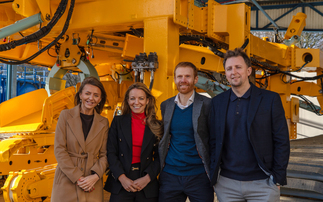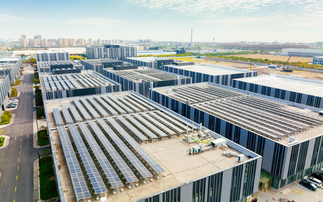Microsoft founder urges businesses to cut emissions as he launches multi-billion dollar scheme to boost dozens of low carbon start ups
Microsoft founder Bill Gates has urged each sector of the economy to explore how they can slash their carbon footprints, as he announced a multi-billion dollar initiative to boost low carbon technology innovation.
Speaking on the sidelines of the COP21 summit today, Gates said every business should look at their energy use and material usage as a first step to curbing their environmental impacts.
"[They should also make] their employees aware so their political voice is speaking out and funding their research agenda," he told BusinessGreen. "But every industry has got to say 'ok, how do we reduce our carbon footprint and how do we contribute to the innovation agenda?"
Gates today launched a multi-billion dollar initiative with 27 other private investors, including Facebook founder Mark Zuckerberg and Alibaba chairman Jack Ma, to help scale up clean tech start-ups.
The initiative, dubbed the Breakthrough Energy Coalition, aims to help small companies pass the "Valley of Death" between developing a promising concept, and delivering a commercial product.
Speaking today alongside US President Barack Obama, Indian Prime Minister Modi, and French President Francois Hollande, Gates warned that climate change is one of the biggest threats facing humanity today, but argued it could be solved through innovation.
"There's not just one path here," he said. "We need to pursue literally dozens and dozens of paths. Each of them will have huge and tough problems, but if we back over 50 different approaches, we know that several of those will give us the solution that we need."
More than 150 world leaders gathered in Paris today for the start of the COP21 climate negotiations. By the end of the fortnight long summit, nearly 200 countries are expected to sign a global deal to tackle climate change.
Speaking to reporters on the sidelines of COP21, Gates said he hoped the launch of the Energy Breakthrough Coalition today would encourage governments to reach a deal. Specifically, he predicted the announcement could pave the way for countries to step up their ambition on cutting carbon emissions after 2020.
"The announcements here of the research and private sector will I think surprise people and that will be a key thing that enables them to strengthen their commitments five or ten years from now to get us on a less than two degree path," he added.
He argued innovation was crucial to delivering on climate goals agreed at the summit as it would help to reduce energy costs in the long run.
"Five years from here, if the premium cost for clean energy is close to zero, then yes, that will be a key thing to increase commitments," he added. "In fact, it's one of the key things that would allow make people to make stronger commitments. So five, 10 or 15 years from now, I think with all three of these milestones, the innovation process will define how much people strengthen their commitments and hopefully somewhere in there you get to the two degree scenario - that's the hope."
Tens of global leaders also today launched Mission Innovation - a public-private partnership aimed at "dramatically scaling up" clean energy innovation investment. Twenty countries, including China, India and Brazil, committed to double their clean energy research and development (R&D) spending over five years.
The UK also became the first non-founding member of the partnership, today promising to invest more than £400m a year by the end of the decade in a range of R&D programmes aimed at tackling climate change.
Speaking at the launch event, Obama also underlined the role businesses would need to play in helping to solve the key question of how to tackle climate change without derailing efforts by poor countries to grow their economies.
"Helping developing nations skip the dirty phase of development is vital to meeting this challenge," he said. "It's one of the things that Prime Minister Modi and I have discussed.
"We cannot forge a climate agreement that says countries are permanently resigned to not have electricity.
"So we have to make sure the same process of development is taking place using a whole new set of technologies and arrangements."
UK Prime Minister David Cameron had been lined up to also speak at the launch, but his speech was cancelled due to the late running of the event.
Speaking later in his address to the plenary session of the summit, he argued businesses had a crucial role to play in tackling climate change.
He also urged world leaders to deliver an ambitious deal that includes five year review mechanisms which would be loosely modelled on the UK Climate Change Act.
"Instead of making excuses tomorrow to our children and grandchildren we should be taking action against climate change today," he said.
This article is part of BusinessGreen's Road to Paris hub, hosted in association with PwC.







